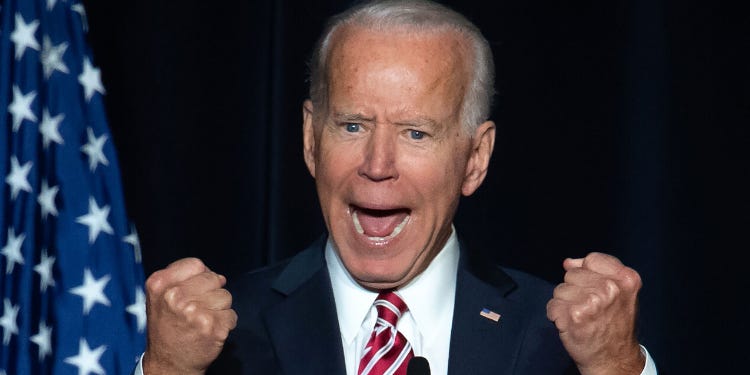One theme President Trump’s re-election campaign hopes will strike a chord with voters is the idea that, if elected, Joe Biden (who successfully ran as a relative moderate in the Democratic primary) will cave to the pressures of the increasingly unhinged, far-left elements of his party's base.
Here’s a Trump campaign ad even depicting Biden as a "Trojan Horse" for the agenda of Bernie Sanders, AOC, and Ilhan Omar (arguably the most progressive Democrats in congress):
The narrative was recently bolstered by U.S. Senator Tammy Duckworth, who’s being seriously looked at as Biden’s running mate. When asked about recent incidents of mobs tearing down U.S. historical statues (most related to the Confederacy), Duckworth expressed affinity for the sentiment behind it, but then went as far as to entertain the notion of even George Washington statues being taken down.
George Washington?
While it’s doubtful that Duckworth has any legitimate interest in removing statues of our nation’s first president, it speaks volumes about the Democratic base (or at least an important voting faction within that base) that Duckworth felt she needed to remain publicly open to the idea.
Biden himself recently added to the theme with this tweet:
Many on the right immediately recognized how similar the wording was to Barack Obama’s infamous remark in October of 2008 about “fundamentally transforming the United States of America.” One can read all sorts of things into a statement like that, including the premise of waging an ideological assault on our nation’s traditions, freedoms, and exceptionalism.
So, on paper, the Trump strategy to portray Joe Biden as a Trojan Horse doesn’t seem like all that bad of an idea. There’s just one problem…
In order for the approach to resonate or even make sense, there has to be an element of the unknown. In Greek mythology, the huge wooden horse for the Trojans was a novelty. It was something the city of Troy hadn’t seen before; something they were unfamiliar with. The mystique surrounding it is what compelled the Trojans to let down their guard... and ultimately pay the price for that decision.
Joe Biden isn't a novelty. He's not a shiny new, mysterious object. He's not even unfamiliar. Americans know him, or at least they feel like they do. After all, he was our nation’s vice president for eight years (and a longtime U.S. senator before that), and during that time virtually no one viewed him as ideologically radical or scary.
Bumbling? Yes. Occasionally creepy? Sure. But radical? The only people who would have thought so were those on the right who view all Democrats as radical, and therefore would never consider voting for him in the first place.
Last week, David Weigel pointed out something rather interesting in the Washington Post:
“By this point in 2016, the conservative publisher Regnery was selling eight books about Hillary Clinton; by this point in 2012, it was selling 13 books about Barack Obama. The publisher is offering just one book about this year’s nominee, the upcoming “The Biden Deception,” which asks whether Biden is a “crypto-socialist.” That’s it, and no other books critical of Biden, specifically, are being published right now.
This would seem to be a rather valuable metric in regard to Biden’s public image, and the challenges pro-Trumpers face in their efforts to make him frightening. If Bernie Sanders were the presumptive Democratic nominee, you can bet there’d be lots of such titles in the works right now.
Additionally, while Biden has embraced some pretty progressive themes, he has also publicly rejected a lot of popular far-left sentiment that Republicans were assuredly hoping he’d take the bait on. He has rebuffed calls to “defund the police,” he didn’t endorse the New Green Deal, he has voiced opposition to single-payer health care, and he recently promised that fracking “is not going to be on the chopping block” if he’s elected. He also did what Senator Duckworth had trouble doing: call for the protection of statues memorializing our founding fathers.
Could he be lying about all of those positions, and change them the moment he’s elected? Absolutely. But it’s awfully difficult to define a politician with views he’s publicly and actively rejecting.
It’s also hard to define a candidate by his political and even personal associates, as the GOP learned when promoting Barack Obama’s very real ties to Bill Ayers and Jeremiah Wright. Sure, Joe Biden isn’t half the candidate that Obama was… but an endorsement from someone like Bernie Sanders also isn’t half as concerning (to most people, anyway) as friendships with a domestic terrorist and a 9/11-taunting pastor who shouted “God damn America.”
As far as Biden’s abstract vow to “transform” America, it was certainly a provocative statement. But Obama (who most people think of as being more liberal than Biden) wasn’t hurt politically when he said the same thing. And at a time when the country is suffering from the crippling effects of a global pandemic, transformation may strike a lot of people as meaning something entirely different than an ideological agenda. It might even mean something hopeful; there's a lot of political flexibility that comes with such vague rhetoric.
Trump and the GOP are certainly well within their rights to portray Biden as a closet radical, or a puppet of more easily identifiable radicals. If there's enough campaign money, it's probably worth the try. And if Biden wins, maybe his opponents will be proven right.
But prior to election night, I suspect it will be an awfully hard message to sell to persuadable voters.




